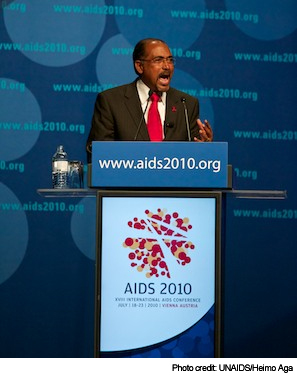 The XVIII International AIDS Conference opened on Sunday 18 July in the city of Vienna. With open arms, Austria has welcomed an estimated 20,000 delegates from all over the world who will spend the next week taking part in conference sessions and satellite meetings under the theme "Rights Here, Right Now" selected to emphasize the critical connection between human rights and HIV.
The XVIII International AIDS Conference opened on Sunday 18 July in the city of Vienna. With open arms, Austria has welcomed an estimated 20,000 delegates from all over the world who will spend the next week taking part in conference sessions and satellite meetings under the theme "Rights Here, Right Now" selected to emphasize the critical connection between human rights and HIV.
The opening ceremony began with a video message form Secretary-General Ban-Ki Moon reiterating UNAIDS' new vision for the AIDS response: zero new infections, zero discrimination and zero AIDS-related deaths.
The Executive Director of UNAIDS, Mr Michel Sidibé, in his speech to delegates, stressed that this conference comes at a defining moment in the AIDS response. He focused his remarks on the transformation that is required to break the trajectory of the epidemic.
Mr Sidibé spoke on the urgency for a new approach to antiretroviral treatment, and introduced Treatment 2.0.
"Treatment 2.0 radically simplifies treatment to maximize the number of people who can benefit. This will save more money. But in the end, we will only be measured by the number of lives we save," he said.
This new treatment model is also relevant in the European context said John Dalli, European Union Commissioner of Health and Consumer Policy. Mr Dalli stressed that there are major treatment inequalities across the European Union, with cost of treatment differing from country to country and treatment stocks sometimes running out. He said now is the time to turn targets into tangible results.
A message of commitment to activism was delivered by the singer and activist Ms Annie Lennox, who was recently appointed UNAIDS International Goodwill ambassador.
"HIV should not be stigmatized, it should be normalized" said Ms Lennox "There must be no more discrimination of HIV."
Remarks were also made by Ms Brigitte Schmied, president of the Austrian AIDS Society and local chairperson of the conference, as well as by Dr Julio Montaner, the president of the International AIDS Society, who echoed Mr Sidibé's call for Treatment 2.0. "Treatment 2.0 is the single most important thing coming out of this meeting", said Dr Montaner. "Let's rally behind it, and let's rally behind universal access."
The community welcome was given by Vladimir Zhovtiak from Ukraine and Sasha Volgina from the Russian Federation. They delivered a joint address on the urgency of the HIV epidemic in the eastern Europe and central Asian region. "The epidemic in our region is the fastest growing epidemic in the world. We are dying less, but we are dying faster", said Ms Volgina.
Twenty-two year old Rachel Arinii, a regional member of the Global Youth Coalition on HIV/AIDS from Indonesia, delivered inspiring remarks representing all young people at AIDS 2010. "Young people are too young to die. We call on our leaders to provide evidence-based sexuality education in and out of schools," said Ms Arinii.
The Federal President of Austria, Mr Heinz Fisher, closed the ceremony where he welcomed the delegates to the conference as well as the country.
AIDS 2010 is convened by the International AIDS Society in partnership with a number of international, regional and local partners. These include local scientific leadership, the City of Vienna and the Government of Austria, Aids Hilfe Wien, Austrian AIDS Society, East European & Central Asian Union of PLWH (ECUO), European AIDS Clinical Society (EACS) and the European Commission.
International partners for AIDS 2010 include Joint United Nations Programme on HIV/AIDS (UNAIDS), including its co-sponsors, the World Health Organization (WHO) and the United Nations Office on Drugs and Crime (UNODC), International Council of AIDS Service Organizations (ICASO), Global Network of People Living with HIV/AIDS(GNP+)/International Community of Women Living with HIV/AIDS (ICW), World YWCA and Caribbean Vulnerable Communities Coalition (CVC).
AIDS 2010, as the conference is widely known, is the premier gathering for people working in the field of HIV, as well as policy makers, people living with HIV and other individuals committed to ending the epidemic. The event, the largest AIDS conference in the world, is held every two years.
Located at the heart of Europe, the conference will put the spotlight on HIV epidemics in Eastern European and Central Asia, the only region where HIV prevalence clearly remains on the rise. The conference programme will present new scientific knowledge and offer opportunities for structured dialogue on the major issues facing the global response to HIV. Other related activities, including the Global Village with its cultural program, exhibitions and affiliated events will open up space for dialogue and reflection.
The conference runs until the 23 July, 2010.